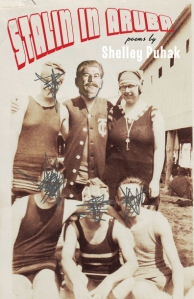
"Stalin in Aruba"
by Shelley Puhak
Poetry
Black Lawrence Press, 2010
$ 14.00, 80 pages
ISBN: 978-0615319308
Steeped in the bleak history of mid-twentieth century Europe, Shelley Puhak’s award-winning Stalin in Aruba nevertheless brims with a dark humor. The poetry, lyrical, full of fresh, vivid imagery, is saturated with grim irony. Even the title suggests this, juxtaposing one of history’s most monstrous dictators with an idyllic vacation island. In the eponymous poem, indeed, Stalin’s infamous liquidation of his enemies and undesirables blends into the techniques of photographic manipulation, cropping, chopping, clarifying pictures, as if genocide were merely an option in a Photoshop program. “Purging the Aunties,” a poem based on Stalin’s arrest and execution of many of his female relatives, is likewise set during two birthday celebrations for touchy Uncle Soso, again juxtaposing the horrific with the mundane, bringing to mind the macabre image of skeletons dancing during the Black Plague.
Puhak paints a similar picture of Hitler. “The Fuhrer’s Girls” is a five-part poem from the points-of-view of five of Hitler’s lovers, most of them suicides. Geli Raubal, the daughter of Hitler’s half-sister whom he virtually imprisoned in his Munich apartment, speaks of “Uncle Alf,” evoking an image of a comical monster. Only, not so funny: whether murdered or killed by her own hand, it was with “Uncle Alf’s” gun that she was killed.
Uncle Alf’s Walther eight-caliber
against my chest,
Emil, Emil, I whisper,
until my nipples clot up, hard.
Even the titles of many of these poems burst with sardonic wit: “What They Left Out of My Obituary,” “Yevgenia’s Pick-Up Line,” “Why Lenin’s Embalmer Will Miss Dinner,” “The Lady Laudanum-Drunker, 1889”: they almost sound like punchlines, and then you read the poems and realize, again, they aren’t so funny after all. Yevgenia is the adulterous wife of Konstantinov, the chief of the secret police, too exhausted from his duties of torture to satisfy his wife so she seeks her pleasures elsewhere - under his own nose. Lenin’s embalmer is missing dinner to put the final touches on Lenin’s corpse, and even though he promised to come to Vlasta’s dinner, he is scared witless; this is a delicate matter, what with:
nights, boots up the back staircase
mornings, doors jawing open
and new neighbors next week.
If he doesn’t want to disappear himself, he will stay late to do the job.
“Lida and the Swan,” alluding to Yeats’ famous poem, “Leda and the Swan,” is a darkly humorous dramatic monologue in the voice of the film star, Lida Baarova, describing her seduction by her lover, Joseph Gorbbels (rumored to have webbed feet) in darkly comic bird imagery (“his narrow lips peck my neck”; “Tonight he will come, moulting khaki”).
While many of the poems in this collection deal with Stalin, Hitler, and their coterie, about half treat other subjects with the same sardonic wit. And just as often these subjects are other monsters. “The Ice-Wife” takes the story of Otzi, the well-preserved mummy of a man frozen over 5,000 years ago in the Alps, on display at the Smithsonian, to create a tender image of love and even devotion. There was evidence, after all, that Otzi had a mate who darned his socks. We have an image of creatures like Shreck and Fiona, the animated Disney monsters of recent film, and, from some ambiguous female speaker talking to some nebulous lover/monster, the poem tenderly concludes:
I pray I’ll know what to carry
up any slope, so if I fall,
if they find me a thousand
years later, they’ll know what I was
and was not without you.
Other poems are downright gothic, befitting a poet from the city of Edgar Allen Poe. “Julia J” and “Dearest Ellen” are poems inspired from the inscriptions on gravestones in a cemetery in Kingsville, Maryland. “Dearest Ellen” is in the voice of the mother of a seven-year old girl buried along with her father in 1814. She sounds a little skeptical about her husband, a little resentful toward her daughter! “Torch” involves people who have martyred themselves in protest by burning themselves up - Vietnamese monks, Quaker war protestors - and employs delicious wordplay to develop its “message,” its image:
The boy is nameless until he twists up into the air,
bends the sky out of focus,
becomes an arching blur of orange,
a hail of ash and pebbled bone,
that blazes in the nasturtiums
trailing their flame
across my yard.
“The Regulars” is a poem told in the second person, addressed to the duped friend of a girl who likes to live dangerously. They find themselves in a hole-in-the-wall bar in a seedy neighborhood, “across MLK Boulevard, the line/between down-on-luck and luckless,” The two girls are broke, but Lisa, the risk-taker, scares up some money for drinks from the regulars there:
A blow job costs twenty, anything else is extra.
With the ten-dollar deposit, she orders
two shots,
change for the jukebox
What are you doing? you hiss.
She cocks her head, ringlets diffusing
the dim light. Shut up and pour.
The upshot is that Lisa disappears, leaving “you” holding the bag. Funny - but not so funny!
Which brings us back to Stalin and Hitler and anybody with power. You could say that the poems in Stalin in Aruba are about power, its corruption and abuse, and you wouldn’t be wrong, but this oversimplifies Puhak’s work, and as she notes in “Stalin in Aruba,” “simplicity and clarity always obfuscate: actions become ideas we only squint at.” There’s much more going on here. Later, in “Where They Are Now,” she again picks up on the theme of “ideas” in a poem about the descendants of the Soviet monsters, and in their refusal to acknowledge certain realities we see this complexity at work, even see the absurd humor of it all:
Grandchildren of liquidators and liquidated
sit at the same lunch table, never asking
whether we are mistaken to love ideas
more than people.

